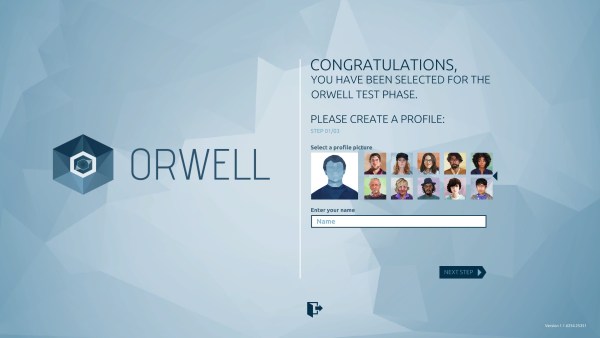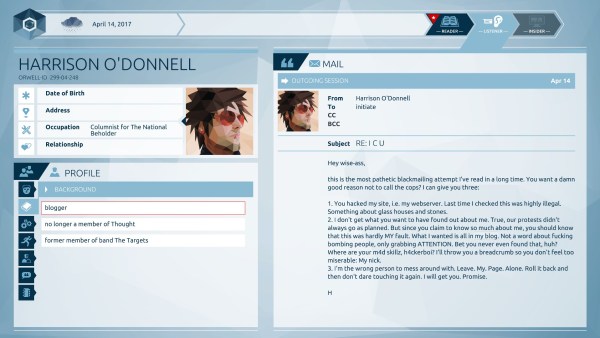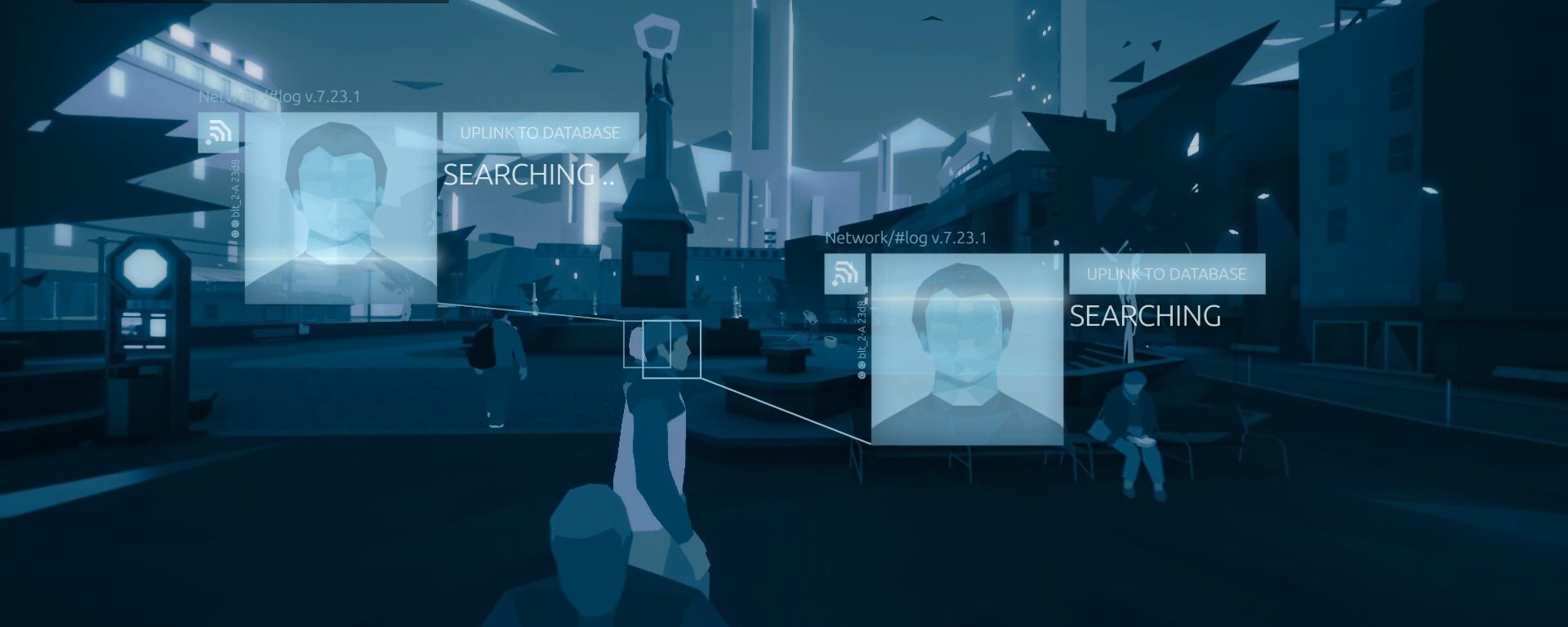
Orwell, developed by Osmotic Studios, thrusts players into a situation of surveillance, where the behavior of citizens is scrutinized for the purpose of identifying threats of national security. The game begins with a terrorist act in which several individuals are killed in an explosion, which spurs The Nation to act via a system called Orwell. As an outsider to The Nation, the player has been chosen as an investigator to collect data and upload it to this system all while being guided by a handle.

In Orwell, people, potential terrorists, are targeted for their friendships, associations, interests, and attitudes toward law enforcement and The Nation. The player must uncover these details by digging through emails, social media profiles, browser history, and recorded chat/phone conversations. The collecting of names, dates of birth, addresses, and phone numbers is common course to feed The Nation’s hunger for information on its citizens.
“The nationalist not only does not disapprove of atrocities committed by his own side, but he has a remarkable capacity for not even hearing about them.” ~ George Orwell
The game is composed of five chapters, and each chapter the player must collect certain data chunks to move the narrative forward. Discover that so-and-so uses an online alias? Track that username down and follow the treasonous comments. But are they traitors? Orwell doesn’t always leave too much room for interpretation, but it does host moments where some things might not be what they immediately appear, and players will have to contemplate which “truth” to upload to the system.

Everything is done through the Orwell interface which is pleasantly designed and easy to access. There were a few moments when I was stuck, uncertain of where to find the correct data chunks, but this had more to do with my ineptitude as a gamer than the interface design. The left most panels feature the profile of whichever subject you highlight at the time while the rest of the screen is dedicated as a space for sleuthing. This is where players sort through various websites, records, and articles pertaining to the subject in question. Information that might be valuable is highlighted in blue and yellow, but not all of the data is relevant. Uploading irrelevant information may result in a rebuke from your handle. I sometimes did this intentionally because why the heck not? 😉
Orwell explores the boundaries between privacy and safety, personal data and government need to know—and the spaces in-between. While it’s an example of a successful interactive fiction game, Orwell has a few hangups.

At times, I felt as though I was simply plugging in information to then be told the next move by Symes, my handle. I didn’t have enough of an impact on what was happening with the narrative and couldn’t help but feel disconnected at times. If the game was much longer than the three and a half to four hours I played, this might have become a major issue.
Another critique is that, for being an investigator, the actual investigating was too easy. I blame this partly on the visual highlighting of potentially useful information. It would have been more satisfying if each sentence or phrase of text, in the case of reports and social media profiles, could be selected without added indication of whether it was relevant. This would encourage players to thoroughly read each document and webpage instead of skipping to the obviously marked text in blue or yellow. It would also make selecting the right data even more essential and call for some actual sleuthing.
Despite a few areas that could use some improvement, Orwell is both unique and has a timely message about surveillance, knowledge, and truth. I do recommend this title, but remember, Big Brother is always watching.



I’ve got this one on my wishlist and will be picking it up in the summer sale! The whole ‘interpretation of truth’ thing really interests me, not to mention that it’s become a hot topic over the past year. Fab post. 🙂
Thank you!
I’ve had this on my wish list for a while and really should get around to picking it up. It seems like such an interesting concept!
Interesting and thought provoking!
“I didn’t have enough of an impact on what was happening with the narrative and couldn’t help but feel disconnected at times.”
“This would encourage players to thoroughly read each document and webpage instead of skipping to the obviously marked text in blue or yellow.”
I haven’t played this, admittedly, but are those things maybe part of the overarching commentary? Like, that “you’re a cog in the machine just passing on information” to higher-ups (and are neither aware of, or directly involved in, the ramifications) in respect to the first point, and in the second, perhaps how software that just catches buzzwords, phrases etc might lead people to skip straight to that bit, without necessarily reading the full context, or nuances etc!?
Again, I haven’t played it, but that was what struck me when I read it!?
You make a valid point that is backed up by the narrative which leaves little doubt you are nothing more than a cog in the machine.
What was less effective about this approach, and something I could have talked about in the post, is that there are times in the game when the pace should be picking up due to increased violence on the streets, the stakes being raised, etc. However, even though those moments should have acted as an increased burden or responsibility urging me to process and collect data quicker to stop such violence, it failed in that regard because the game stayed the same. If the player had a few more gameplay choices or if a timer was present in certain chapters, the pressure would be increased and Orwell would become a more intense and complex game.
But those things obviously aren’t necessary to make Orwell a success. For the most part, what it does it does well.
It sounds quite cool. When I finally get a PC that doesn’t struggle with spider solitaire, I’ll check it out. There seem to be quite a few games along these kind of lines around at the moment, and I like the idea that they’re making people think about important topics in different, or interesting ways.
Sounds like an interesting game! Out of curiosity, would you say it has some use for working with adult learners for critical reading skills and reading comprehension?
I think the game does have potential for that. The text comes in the form of dialogue (from recorded calls and social media messaging and posts) and from websites, newspaper articles, online profiles, and other records. There’s enough variety to keep things engaging.